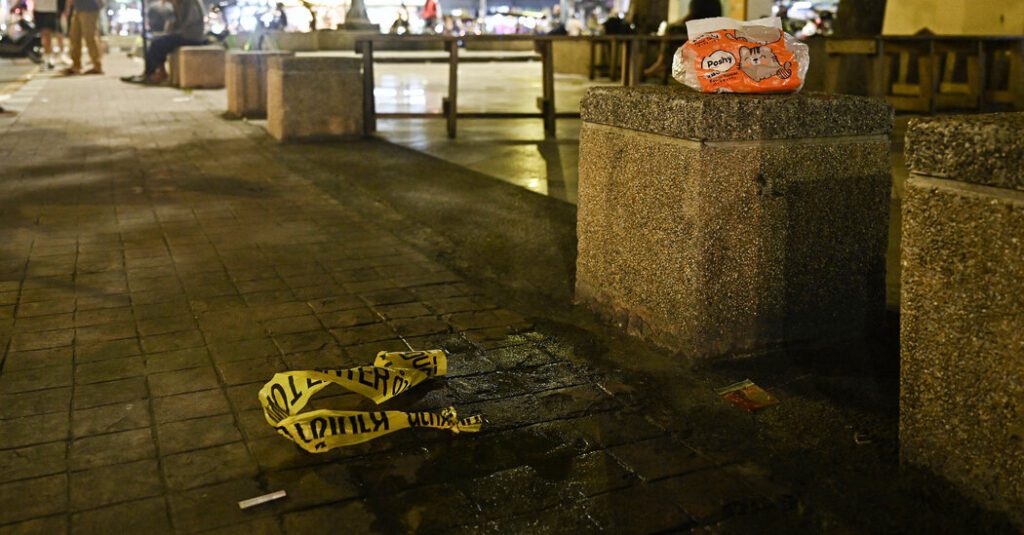On Tuesday afternoon, the suspect was waiting at a noodle stand in downtown Bangkok, where foreign backpackers come and go. Video footage released by Thai police showed him walking towards a bus from the Cambodian border as it arrived. According to witnesses, three gunshots rang out like firecrackers. The assassin then casually returned to the noodle stand where he had parked his motorcycle and left the crime scene.
The victim was Lim Kimya, 73, a former lawmaker of the popular Cambodia National Rescue Party, which was suppressed by the Hun dynasty that ruled the Southeast Asian country for 40 years.
Thai police are continuing to investigate the murder and said an arrest warrant has been issued for the suspect. But Cambodia's beleaguered opposition lawmakers say their ranks have suffered dozens of arrests, imprisonments and assassinations for daring to stand up to the Hun family.
They say the killing of Lim Kimya reflects the kind of political violence that has turned Cambodia into a country where independent thinkers fear for their lives and internationally acclaimed environmentalists go into exile. say.
Um Sam An, also a former CNRP lawmaker who is in political exile in the United States, called Lim Kimya's death a “political assassination.”
“Dictators around the world are increasingly relying on cross-border repression,” said Sam Rainsy, a former party president who himself was the target of repeated assassination attempts.
Cambodian Prime Minister Hun Manet, a graduate of the U.S. Military Academy at West Point, has shown little sign of loosening his family's tight grip on power since officially taking over from his father, Hun Sen, two years ago. Arrests of dissidents continue. On Tuesday, the day of Lim Kim Ya's murder, Hun Sen, who is still president of Cambodia's Senate, pushed for the passage of a law that would classify political dissent as terrorism.
Lim Kimya, a dual citizen of France and Cambodia, was traveling overland from Cambodia to neighboring Thailand with his French wife. She was standing close to him, her face splattered with his blood, as Thai paramedics unsuccessfully attempted CPR.
A Thai criminal court on Wednesday issued a warrant for motorcyclist Ekaruk Paenoi, 41, for the fatal shooting.
Cambodian government spokesman Peng Bona said journalists' questions should be directed to Thai authorities because the killing occurred in Thailand.
Mr Lim Kimya was a French civil servant for over 30 years, working in the Ministry of Economy and Finance. He studied statistics in France, Cambodia's former colonial power, after leaving the country in the 1970s as the country began to descend into anarchy under the radical communist Khmer Rouge. He eventually returned to Cambodia and aligned himself with opposition parties, including the CNRP.
Lim Kimya was elected to parliament in 2013, four years before the party was dissolved by the Cambodian Supreme Court.
Hun Sen was a junior Khmer Rouge official who presided over the deaths of up to a quarter of Cambodia's population. After his government collapsed, he rose to power, eliminated his political opponents, and became the world's longest-serving prime minister before handing over the reins to his eldest son. Cambodia's economy has developed rapidly in recent years with help from China, but corruption and theft are also rampant.
Last month, Rim Kimya wrote on his Facebook page about the dramatic ouster of Syrian dictator Bashar al-Assad, who inherited power from his father. He noted the familial nature of the al-Assad political dynasty. He wrote about the misery of dictatorship. There was no need for a direct comparison with Cambodia for the criticism to sting.
“Mr. Lim Kimya was a highly educated patriot who served both his homeland and his adopted country, France,” said another former opposition leader who is under house arrest in Cambodia's capital Phnom Penh. Kem Monovitya, the exiled daughter of Kem Sokha, said: After being sentenced to 27 years for treason.
Thailand's capital, Bangkok, is a magnet for political dissidents from neighboring authoritarian states, as well as a hub for deportations and forced removals that human rights groups say are bordering on illegal. In November, seven Cambodians registered with the UN refugee agency were deported by Thai authorities. Upon their return, six of the seven, one of them a child, were charged with treason in a Cambodian court.
Thailand is not party to the UN Refugee Convention and does not formally recognize individuals claiming political asylum. Thai authorities have returned asylum seekers and others seeking refuge here to Vietnam, Laos, China and other countries with repressive governments.
Hundreds of Cambodian dissidents have flooded into Thailand in recent months, horrified by the deportation and murder of Lim Kimya last year.
Kem Monikosar, 52, a political activist, fled persecution in Cambodia two years ago. Despite being registered with the United Nations refugee agency, he says he has barely left his room in Thailand. He was concerned about the possibility of political assassination. Then, on Tuesday, came the murder of Lim Kimya.
“As an asylum seeker in Thailand, I am very concerned about my safety,” he said. “A murder plot is being planned.”
San Narin I contributed a report from Phnom Penh, Cambodia. Muktita Suhartono From Bangkok.

